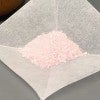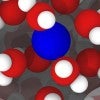
Manganese makes its mark in drug synthesis
Rice University chemists find manganese far superior to silver and cerium as a way to make building blocks for drug design and manufacture.

Manganese makes its mark in drug synthesis
Rice University chemists find manganese far superior to silver and cerium as a way to make building blocks for drug design and manufacture.

Urban mining for metals flashes electronic trash into treasure
Flash Joule heating recovers valuable and toxic metals from electronic waste. The process allows for “urban mining” of resources that could be a win for the environment as well as for manufacturers.

Corps of Engineers funds bid to ‘flash’ waste into useful materials
A $5.2 million U.S. Army Corps of Engineers grant will expand Rice efforts to recycle waste into valuable products through flash Joule heating.

US Army backs ‘sleeping cap’ to help brains take out the trash
Rice engineers are developing a noninvasive device to understand how the brain disposes of metabolic waste during sleep.

Sylvia Dee wins fellowship to launch Gulf of Mexico study
Sylvia Dee, an assistant professor of Earth, environmental and planetary sciences, wins an early-career fellowship to pursue Gulf of Mexico research.

American Chemical Society honors Gustavo Scuseria
Rice University’s Gustavo Scuseria wins the American Chemical Society Award in Theoretical Chemistry.

NSF-backed ‘team of teams’ raises stakes for master’s students
Four institutions will share an NSF grant of nearly $5 million to support scholarships for students seeking master’s degrees in engineering and related fields.

NSF extends Physics of Living Systems network at Rice
The NSF awards nearly $3 million to the Center for Theoretical Biological Physics to continue its leadership role in the Physics of Living Systems graduate research network.

A loose-fitting mask may be doing you no favors if you’re around SARS-CoV-2.

Sex and the symbiont: Can algae hookups help corals survive?
Scientists have discovered that symbiotic single-celled algae that live inside of and feed corals can reproduce not only by mitosis, but also sexually. Encouraging sex in these algae can accelerate their evolution to produce strains better able to help reefs cope with climate change.

Rice lands grant to improve time-release drugs
HOUSTON – (Sept. 21, 2021) – Time-released drugs are about to get a geometry lesson, thanks to bioengineers at Rice University.

Grant backs effort to build useful bacterial colonies
Rice scientists have won a grant to advance the development of custom-designed microbial colonies for a variety of applications.

Modern simulations could improve MRIs
Rice University engineers improve simulations that analyze gadolinium-based contrast agents used in clinical magnetic resonance imaging. More efficient simulations could help make better compounds for imaging technologies.

NIH funds effort to customize treatment of movement impairments
Existing treatments for movement impairments are “off the rack” rather than “custom-tailored,” but B.J. Fregly, a Rice University professor of mechanical engineering and bioengineering, wants to change that situation.